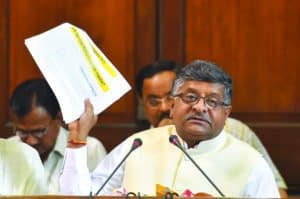Will the BJP and Congress please come clean on their association with CA’s India partner?
Cambridge Analytica (CA) is in the eye of a storm after an undercover investigation caught some of its senior executives boasting about psychological manipulation, entrapment techniques and fake news campaigns in order to manipulate voters.
Not only that, a Britain-based news agency, Channel 4, has filmed senior executives at CA, including its Chief Executive Officer Alexander Nix, suggesting the firm could use sex workers, bribes and misinformation in order to try and help political candidates win votes around the world.
Data collected by an app created by Aleksandr Kogan, the Cambridge University researcher at the centre of Facebook’s data breach allegations, was used to target voters in the 2016 US presidential election. The firm mined the information of about 50 million Facebook users, according to whistleblower Christopher Wylie.
Now, questions are being raised whether CA has worked or was in talks with Indian political parties and whether or not it used the same techniques that it had used in other parts of the globe to help Indian parties win elections.
Let us start by answering the first part of that question. Did CA work or was in talks with Indian political parties?
Cambridge Analytica’s website states that it was contracted to undertake an in-depth electorate analysis for the Bihar Assembly election in 2010. The details about CA’s work in India are still available at the time of writing this article.
One must remember that this election was won with a landslide margin by the Janata Dal United-Bharatiya Janata Party alliance, winning 206 out of 243 Assembly seats. It seems that it was during this election that the National Democratic Alliance’s (NDA) tryst with CA began and only flourished thereon.

CA’s parent company Strategic Communications Laboratories (SCL) partnered with Ovleno Business Intelligence (OBI) for operations in India. OBI is run by Amrish Tyagi, son of JD-U leader and Rajya Sabha Member of Parliament KC Tyagi. Himanshu Sharma, a Director of Ovleno, has been scrubbing his profile of links with BJP’s Mission 272 but a simple archive search reveals that he had BJP’s Mission 272 mentioned on his LinkedIn profile till very recently.
Alt News’ founder Pratik Sinha has put this out on Twitter.
Himanshu Sharma of Ovleno which is a sister concern of Cambridge Analytica is scrubbing his profile of links with BJP’s Mission 272 but Internet doesn’t forget. pic.twitter.com/IzzUqDoqwA
— Pratik Sinha (@free_thinker) March 21, 2018
NDTV journalist Sreenivasan Jain has also posted a screenshot where Sharma claims to have “managed 4 elections successfully for BJP” and “helped achieve Mission 272”.
Here are screenshots of LinkedIn page of Director of Cambridge Analytica’s Indian arm, saying “managed 4 elections successfully for BJP”, “helped achieve mission 272.” @BJP4India: response please? pic.twitter.com/NaxNJJdzzb
— Sreenivasan Jain (@SreenivasanJain) March 21, 2018
According to media reports, Cambridge Analytica CEO Alexander Nix met UPA leaders in the mid and towards the end of 2017 to design an electoral strategy for the 2019 elections.
According to my sources, three top leaders from the Congress were given presentations. The idea to get CA on board was being strongly considered and in fact the CA team had also been asked to prepare a draft for the Karnataka campaign. My source is not in the know of what happened after that, but may be the Congress top brass can give more details on what happened to the plan.
Now, coming to the more important question – did CA employ dark methods to obtain data of Indian voters and to manipulate them?
In the 2015 Bihar elections, poll strategist Prashant Kishor as well as Amrish Tyagi were working for the Nitish Kumar campaign. That campaign eventually thwarted a BJP victory in the state. Many of us received WhatsApp forwards from unknown numbers during 2014 and 2015. Did we sign up for that? Then how did our data become public? Where did they procure the data from? Was the data procured legally? Was user consent taken?
In India, a black market data industry is flourishing despite the watchful eyes of the Telecom Regulatory Authority of India (TRAI). Our phone numbers, email ids and other details are floating around in excel sheets and now there is that additional level of leakage of biometric data with Aadhaar.
TRAI averted a serious threat by stopping Facebook’s internet.org but we do not know how much of our data is still being leaked to the black market via third-party apps on Facebook.
If CA intervened in any of the elections, it eventually amounts to foreign intervention in the electoral process. Maybe it is time we think about the extent to which political parties and governments can use paid agencies for social media. Perhaps we need to rethink the entire premise of boosting social media using paid promotions, especially for political and electoral purposes. Maybe we need to put a stop to the way election management companies have started taking over the democratic process and reducing elections to a marketing exercise akin to that of selling a soap or hair oil.
We need to rethink how our democracies need to adapt to changes in social media in order to save citizens from being reduced to bits and bytes of data that are segmented, targeted and manipulated by companies like CA.
Full disclosure: The author is social media strategist of Aam Aadmi Party and in-charge, USA
This article was first published in Newslaundry.





